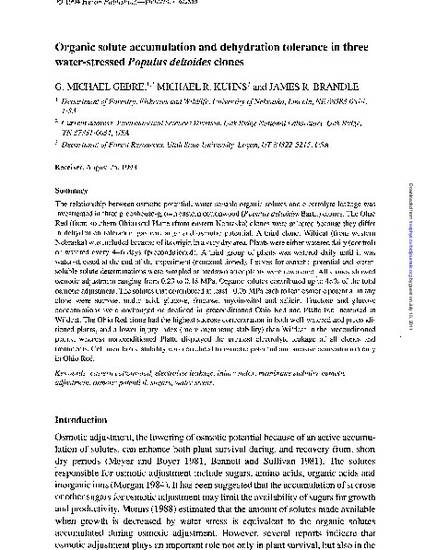
Article
Organic Solute Accumulation and Dehydration Tolerance in Three Water-Stressed Populus deltoides clones
Tree Physiology
(1994)
Abstract
The relationship between osmotic potential, water-soluble organic solutes and electrolyte leakage was investigated in three greenhouse-grown eastern cottonwood (Populus deltoides Barn.) clones. The Ohio Red (from southern Ohio) and Platte (from eastern Nebraska) clones were selected because they differ in dehydration tolerance, gas exchange and osmotic potential. A third clone, Wildcat (from western Nebraska) was included because of its origin in avery dry area. Plants were either watered daily (control) or watered every 4-6 days (preconditioned). A third group of plants was watered daily until it was water-stressed at the end of the experiment (nonconditioned). Leaves for osmotic potential and water- soluble solute determinations were sampled at predawn after plants were rewatered. All clones showed osmotic adjustment ranging from 0.23 to 0.48 MPa. Organic solutes contributed up to 48% of the total osmotic adjustment. The solutes that contributed at least -0.05 MPa each to leaf osmotic potential in any clone were sucrose, malic acid, glucose, fructose, myoinositol and salicin. Fructose and glucose concentrations were unchanged or declined in preconditioned Ohio Red and Platte but increased in Wildcat.
Disciplines
Publication Date
1994
Citation Information
Michael R. Kuhns. "Organic Solute Accumulation and Dehydration Tolerance in Three Water-Stressed Populus deltoides clones" Tree Physiology Vol. 14 (1994) p. 575 - 587 Available at: http://works.bepress.com/michael_kuhns/221/
